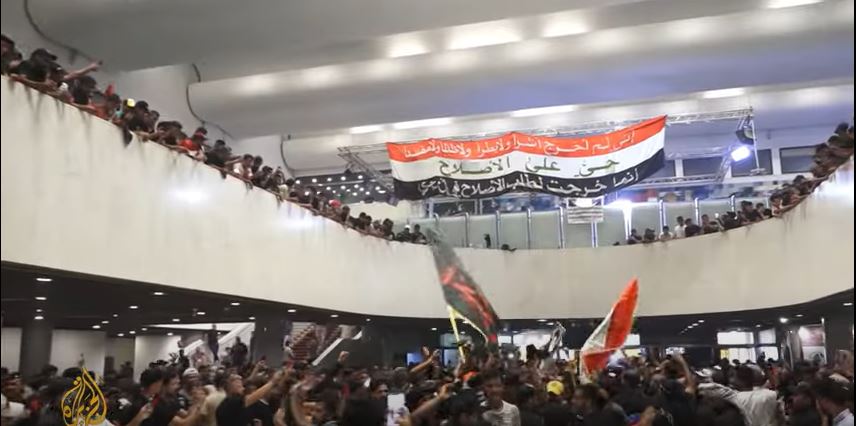The Iraqi parliament elected its new president and, in turn, its prime minister last week, clearing nearly a year of political deadlock in the country. As the new leaders are set to form a new government, the movement of Iraqi Shia cleric Muqtada al-Sadr announced its refusal to join.
The Sadrist faction of lawmakers announced Saturday that they would not join the new government being formed by prime minister-designate Mohammad Shia al-Sudani. The refusal by the Sadrist movement comes two days after the Iraqi parliament elected Abdul Latif Rashid as the new president, who designated al-Sudani. al-Sudani is backed by the pro-Iran Coordination Framework that has 128 out of 329 seats in parliament.
“We stress our firm and clear refusal for any of our affiliates to participate…in this government formation,” tweeted al-Sadr’s close associate, Mohammed Saleh al-Iraqi.
In a statement Saturday, al-Iraqi said the new government “has a clear subordination to militias” and that it would not “meet the people’s aspirations.”
al-Iraqi added that the Sadrist movement does not intend to participate in any government formed by al-Sudani “or any other candidate from among the old faces or those affiliated with the corrupt.” al-Iraqi said that those who choose to associate themselves with their ministries “does not represent us.”
Back in June, al-Sadr ordered his faction of lawmakers that hold 73 seats in parliament to resign, leaving the chamber to the pro-Iran Coordination Framework, which includes representatives of the former paramilitary unit Hashd al-Shaabi.
The incoming cabinet would be facing $87 billion in revenue from oil exports that are kept in the central bank’s coffers. The funds could be used to rebuild infrastructure in the country, but it could only be used after lawmakers approve the state budget proposed by the government once formed.
The United States welcomed Rashid’s election as the country’s new president last week, breaking the deadlock that started when al-Sadr’s bloc won the most seats in parliament in October last year.
“The United States urges all parties to refrain from violence and to resolve differences amicably and peacefully through the political process,” the US State Department said in a statement.



 U.S. Lawmakers to Review Unredacted Jeffrey Epstein DOJ Files Starting Monday
U.S. Lawmakers to Review Unredacted Jeffrey Epstein DOJ Files Starting Monday  Japan Election 2026: Sanae Takaichi Poised for Landslide Win Despite Record Snowfall
Japan Election 2026: Sanae Takaichi Poised for Landslide Win Despite Record Snowfall  Trump Backs Nexstar–Tegna Merger Amid Shifting U.S. Media Landscape
Trump Backs Nexstar–Tegna Merger Amid Shifting U.S. Media Landscape  Missouri Judge Dismisses Lawsuit Challenging Starbucks’ Diversity and Inclusion Policies
Missouri Judge Dismisses Lawsuit Challenging Starbucks’ Diversity and Inclusion Policies  Trump’s Inflation Claims Clash With Voters’ Cost-of-Living Reality
Trump’s Inflation Claims Clash With Voters’ Cost-of-Living Reality  Pentagon Ends Military Education Programs With Harvard University
Pentagon Ends Military Education Programs With Harvard University  Nighttime Shelling Causes Serious Damage in Russia’s Belgorod Region Near Ukraine Border
Nighttime Shelling Causes Serious Damage in Russia’s Belgorod Region Near Ukraine Border  U.S.-India Trade Framework Signals Major Shift in Tariffs, Energy, and Supply Chains
U.S.-India Trade Framework Signals Major Shift in Tariffs, Energy, and Supply Chains  U.S. to Begin Paying UN Dues as Financial Crisis Spurs Push for Reforms
U.S. to Begin Paying UN Dues as Financial Crisis Spurs Push for Reforms  TrumpRx.gov Highlights GLP-1 Drug Discounts but Offers Limited Savings for Most Americans
TrumpRx.gov Highlights GLP-1 Drug Discounts but Offers Limited Savings for Most Americans  India–U.S. Interim Trade Pact Cuts Auto Tariffs but Leaves Tesla Out
India–U.S. Interim Trade Pact Cuts Auto Tariffs but Leaves Tesla Out  U.S. Announces Additional $6 Million in Humanitarian Aid to Cuba Amid Oil Sanctions and Fuel Shortages
U.S. Announces Additional $6 Million in Humanitarian Aid to Cuba Amid Oil Sanctions and Fuel Shortages  New York Legalizes Medical Aid in Dying for Terminally Ill Patients
New York Legalizes Medical Aid in Dying for Terminally Ill Patients  Trump Allows Commercial Fishing in Protected New England Waters
Trump Allows Commercial Fishing in Protected New England Waters  Federal Judge Restores Funding for Gateway Rail Tunnel Project
Federal Judge Restores Funding for Gateway Rail Tunnel Project  Trump Signs “America First Arms Transfer Strategy” to Prioritize U.S. Weapons Sales
Trump Signs “America First Arms Transfer Strategy” to Prioritize U.S. Weapons Sales 































